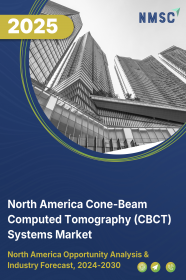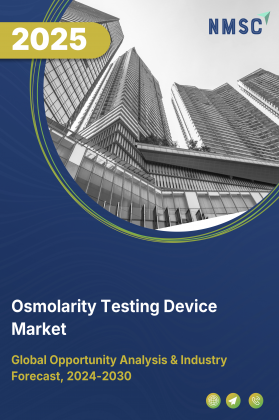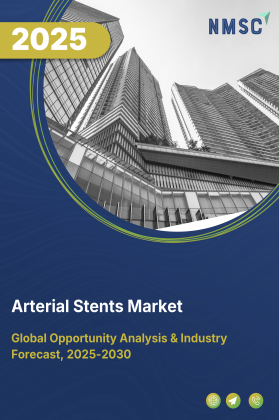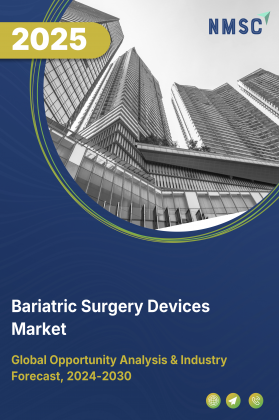
North America Cone-Beam Computed Tomography (CBCT) Systems Market by Type (Floor Mounted and Wall Mounted), by Patient Position (Seated, Supine, and Standing), by Detector Type (Image Intensifier and Flat-Panel Detector), by Field of View (Small FOV Systems, Medium FOV Systems, and Large FOV Systems), by Application (Dental, ENT Applications, Orthopedic Conditions, and Others), and by End-Users (Dental Clinics, Hospitals, and Others)– Opportunity Analysis and Industry Forecast, 2025–2030
Industry: Healthcare | Publish Date: 24-Apr-2025 | No of Pages: 154 | No. of Tables: 112 | No. of Figures: 77 | Format: PDF | Report Code : HC806
North America CBCT Systems Market Overview
North America CBCT Systems Market size was valued at USD 720.1 million in 2024, and is predicted to reach USD 1201.3 million by 2030, at a CAGR of 8.0% from 2025 to 2030. In terms of volume, the market size was 9768 units in 2024, and is projected to reach 18696 units by 2030, with a CAGR of 10.49% from 2025 to 2030.
The factors such as rapid rise in healthcare sector outlay and aging population accelerate the market growth. However, the cost of maintenance and operational works associated with CBCT system are very high and limits the market growth. On the contrary, incorporation of Artificial Intelligence in CBCT systems presents lucrative opportunity for market expansion.
Additionally, the major firms such as OSSTEM IMPLANT CO., LTD., DEXIS LLC, PreXion Inc., Dentsply Sirona Inc., and others are actively producing new products and establishing strategic alliances across different areas to strengthen their market position.
Rapid Rise in Healthcare Sector Spending Fuels North America CBCT Systems Market Growth
The rapid increase in healthcare sector outlay fuels the market growth. With more funds at their disposal, healthcare providers capitalize on sophisticated diagnostic equipment one of that is CBCT system required to improve patients’ conditions. This sophisticated equipment is vitally important and it helps in providing better images for analysis purposes. It also helps in treatment planning and monitoring of patients thereby playing important role in high precision image guided techniques applied during complicated surgical interventions.
Rising Aging population Drives Market Growth
The aging population drives the market growth in North America. As people grow old, they require better ways of diagnosis in order to handle their various health issues such as bone degeneration, dental health, and neurological conditions. Precise imaging modalities such as CBCT is be used to identify and monitor problems associated with tissue changes, certain orofacial anomalies and different central nervous system diseases.
The increased need for appropriate diagnostic tools in relation to age-related medical conditions also contributed towards the adoption of CBCT systems that facilitate this process hence improving the overall standard of healthcare among the elderly.
The High Maintenance and Operational Cost Restricts Market Growth
The substantial maintenance and operational costs associated with CBCT systems pose a major challenge that limits adoption by clinics and healthcare providers across the region and as a result, hinders North America CBCT systems market growth.
Integration of Artificial Intelligence (AI), in CBCT Systems Presents Lucrative Opportunity for Market Expansion
The integration of artificial intelligence in the CBCT market is anticipated to produce noteworthy opportunities for market growth by enhancing diagnostic accuracy. AI algorithms streamline the analysis of imaging data that allows for faster identification of irregularity and easing the workload of health professionals which overall improves patient outcomes and heightens the adoption rates.
Moreover, the implementation of machine learning for image optimization and predictive analysis is expected to simplify the workflows, reducing the need for manual intervention and enhancing the overall effectiveness of CBCT imaging across different healthcare applications.
The U.S. Holds the Dominant Market Share in North America Region
The U.S. holds the largest position in North America CBCT systems market share and experiences high CAGR because of its huge healthcare budgets that push healthcare providers into investing on better diagnostic technologies for improved patient care as well as treatment outcomes. As per a report by the American Medical Association (AMA) on health expenditure predictions for 2024, there was an increase in the US health expenditure of 4.1% in 2022 making it approximate to USD 13,493 for every person with a total spending of around USD 4.5 trillion.
The advance innovations in CBCT systems by key players in the country, fuels the North America CBCT systems market demand by improving imaging quality and operational efficiency. Introduction of Planmeca ProMax 3D by Planmeca in the American industry in May 2024 was meant to help dental experts work better and make more accurate diagnoses. These types of advancements increase the ability to diagnose patients properly and streamline the process of care planning that leads to greater acceptance of CBCT by healthcare professionals nationally.
Mexico to Witness Substantial Growth in the North America CBCT Systems Market
The increased aging population in Mexico is one of the reasons that drive the market because as the elderly fall back on MRI, CT scan etc to combat and treat diseases associated with age. It’s very important for them to get good imaging because at that age there will be a lot of issues such as dental problems, loss of bone density which is also prone to chronic diseases and illnesses.
According to the most recent data from the World Bank Group, the proportion of individuals aged 65 years or older within the Mexican population grew by 28. 6% over the last ten years, rising from 7% during 2013 up to 9% in 2023. In essence, there is an increased need for advanced imaging techniques due to an increasing elderly population, which compels healthcare providers to improve their diagnosis of and treatment strategies for complex geriatric problems.
Furthermore, as per the recent report by the World Bank Group, Mexico having a higher percentage of the market in comparison to Canada in the area is because it experiences increased healthcare costs. These expenditure leads to investment in better medical technology for diagnosing diseases and taking care of patients well.
The data shows that over 3 period the health expenditure per capita in Mexico increased by 8.2% from 1,100 USD in 2018 to 1,190 USD in 2021. Investing heavily in healthcare industry has enabled integration of cutting-edge imaging solutions aimed at enhancing diagnosis quality as well as treatment process efficacy.
Competitive Landscape
The promising key players operating in the North America CBCT systems industry includes PreXion Inc., Dentsply Sirona Inc., Planmeca Inc., Vatech Co., Ltd., Hitachi High-Tech Group, Koninklijke Philips N.V., OSSTEM IMPLANT CO., LTD., DEXIS LLC, Hatch Group Inc., Air Techniques and others.
North America CBCT Systems Market Key Segments
By Type
-
Floor Mounted
-
Wall Mounted
By Patient Position
-
Seated
-
Supine
-
Standing
By Detector Type
-
Image Intensifier
-
Flat-Panel Detector
By Field of View
-
Small FOV Systems
-
Medium FOV Systems
-
Large FOV Systems
By Applications
-
Dental
-
Oral and Maxillofacial surgery (OMFS)
-
Endodontics
-
Implant Dentistry
-
Orthodontics
-
General Dentistry
-
Temporomandibular Joint (TMJ)
-
Periodontics
-
Forensic Dentistry
-
-
ENT Applications
-
Orthopaedic Conditions
-
Neural and Spine
-
Veterinary
-
Other Application
By End-Users
-
Dental Clinics
-
Hospitals
-
Other End-User
By Country
-
U.S.
-
Canada
-
Mexico
Key Players
-
PreXion Inc
-
Dentsply Sirona Inc.
-
Planmeca Inc.
-
Vatech Co., Ltd.
-
Hitachi High-Tech Group
-
Koninklijke Philips N.V.
-
OSSTEM IMPLANT CO., LTD.
-
DEXIS LLC
-
Hatch Group Inc.
-
Air Techniques
REPORT SCOPE AND SEGMENTATION:
|
Parameters |
Details |
|
Market Size Value in 2024 |
USD 720.16 million |
|
Revenue Forecast in 2030 |
USD 1201.36 million |
|
Value Growth Rate |
CAGR of 8.0% from 2025 to 2030 |
|
Market Volume in 2024
|
9768 Units |
|
Market Forecast in 2030
|
18696 Units |
|
Volume Growth Rate |
CAGR of 10.49% from 2025 to 2030
|
|
Analysis Period |
2024–2030 |
|
Base Year Considered |
2024 |
|
Forecast Period |
2025–2030 |
|
Market Size Estimation |
Million (USD) |
|
Growth Factors |
|
|
Companies Profiled |
10 |
|
Countries Covered |
10 |
|
Customization Scope |
Free customization (equivalent up to 80 working hours of analysts) after purchase. Addition or alteration to country, regional, and segment scope. |
|
Pricing and Purchase Options |
Avail customized purchase options to meet your exact research needs. |




















 Speak to Our Analyst
Speak to Our Analyst

























